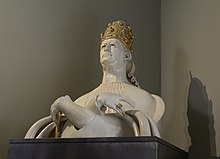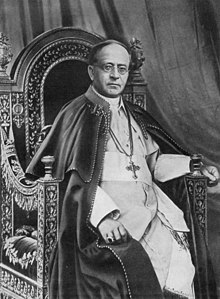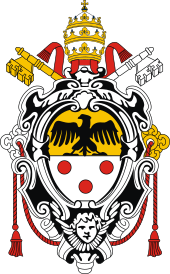Pius XI.
Pius XI. (* May 31, 1857 in Desio ( Lombardy ); † February 10, 1939 in Rome ) - real name Achille Ambrogio Damiano Ratti - was Pope from 1922 to 1939. Pius XI. devoted himself to Leo XIII. of social teaching and coined this term. In the encyclical Quadragesimo anno he devoted himself to the question of the social bond of property .
Life
Until the pontificate
The theologian Achille Ratti studied in the Archbishop's Seminary in Milan from the age of ten and was sponsored by the then Archbishop Luigi Nazari di Calabiana . He was ordained a priest on December 20, 1879 and, as a scholar with three doctorates ( Dr. jur. , Dr. theol. And Dr. phil.), Appointed professor in Milan in 1882. During his time in Milan, Ratti was also an active mountaineer and stood on Mont Blanc , the Matterhorn and the Dufourspitze , among others . In 1888 he became librarian at the Biblioteca Ambrosiana in Milan and in 1907 its prefect, but in 1911 he was appointed to Rome by Pope Pius X. There he became Vice Prefect in February 1912 and Prefect of the Vatican Library on September 1, 1914 .
In 1918 Pope Benedict XV appointed him . (despite a lack of diplomatic experience) as Apostolic Visitator in the reign of Poland , then in 1919 as Apostolic Nuncio in Warsaw and Titular Archbishop of Naupactus . The episcopal ordination took place in Warsaw. The Nuncio remained as the only accredited diplomat in the Polish capital during the threatened siege by the Red Army in the Polish-Soviet war . He gained great respect among diplomats and the love of the Poles. In 1920 Ratti was also papal commissioner for the voting areas of Upper Silesia, East Prussia and West Prussia . In this role his objectivity angered both the German and the Polish side, so that he was recalled in June 1921 to become Archbishop of Milan and shortly afterwards Cardinal with the titular Church Santi Silvestro e Martino ai Monti . After the sudden death of the Pope, the Milan Cardinal was elected Pope on February 6, 1922 after a four-day conclave in the 14th ballot and was crowned on February 12, 1922 . In the conclave, as so often in the college of cardinals in recent papal history , pious zealots ( “ zelanti ” , especially Merry del Val ) and more diplomatic “politicians” ( “politicanti” , especially Pietro Gasparri ) faced each other. The impressive personality of Cardinal Ratti then convinced both sides, especially the group around the previous Cardinal Secretary of State Pietro Gasparri, that Ratti's election as Pope Pius XI. propelled forward. Through indiscretions, church history research has access to precise records of this conclave, as well as of the 1914 conclave .
pontificate
With his inaugural encyclical Ubi arcano Dei of December 23, 1922, the new Pope announced his program: pax christi in regno christi , the peace of Christ in the kingdom of Christ. He expressly made the pastoral and political concerns of his two predecessors his own, condemned “social modernism” and developed positive guidelines for a peaceful social order based on the Catholic religion.
Under Pius XI. succeeded in solving the "Roman question" of the sovereignty of the Papal States. On February 11, 1929, he signed the Lateran Treaty with Benito Mussolini , through which the Vatican City gained independence. In addition, Catholicism was declared the state religion in the Lateran Treaties (until 1984), religious instruction was compulsory and anti-church propaganda was prohibited. Relations with the fascist government deteriorated noticeably. This led to the publication of the encyclical Non abbiamo bisogno in 1931 . He concluded numerous concordats and wrote encyclicals, for example the social encyclical Quadragesimo anno (1931), in which, influenced primarily by Gustav Gundlach and Oswald von Nell-Breuning SJ , he called for the general social application of the principle of subsidiarity .
His most important Concordat, besides the Lateran Treaties, is probably the Reich Concordat with the German Reich of September 10, 1933. Often Pius XI. and also his successor Pius XII. accused of not having turned against National Socialism clearly enough . Edith Stein advised him of the persecution of the Jews early on. Defense lawyers point out, however, that the German encyclical Mit Brennender Sorge (Latin Ardente cura ), which was published in 1937 and which had to be distributed in secret in Germany, condemned National Socialist ideology. It says:
“Anyone who removes the race, or the people, or the state, or the form of government, the bearers of state power or other basic values of human community formation - which claim an essential and honorable place within the earthly order - from this of their earthly value scale, makes them the highest norm everyone, including those who make religious values and idolize them with idol worship, perverts and falsifies the God-created and God-commanded order of things. Such a belief is far removed from a true belief in God and a view of life corresponding to such belief. "
If this encyclical dealt primarily with the breach of the Reich Concordat by the National Socialists, the planned encyclical Humani generis unitas (“The unity of the human race”; partly also cited as Societatis Unio ) should directly condemn the National Socialist racial ideology. The Pope commissioned his German adviser Gustav Gundlach and two other Jesuits with a draft. However, the encyclical was not published because work on the text could no longer be completed during the Pope's lifetime. In addition, the effects of a publication were uncertain. However, parts of the concept of the “hidden encyclical” were later used by Pius XII, namely in the encyclical Summi pontificatus . Even after the encyclical Pius XI condemned. the persecution of the Jews sharp. Moved to tears, he told Belgian pilgrims in September 1938 that “no Christian should have any connection with anti-Semitism”.
Another encyclical, Divini redemptoris , was published in 1937 . It denounced communism much more clearly than national socialism and, in view of the persecution of the church, also took sides against the “atrocities of communism in Spain”. However, Pius XI. since the opening of the Vatican archives for the time of his pontificate in autumn 2006, according to research by the historian Vincente Cárcel Ortí, "a distance (...), if not even opposition of the Pope to the Generalísimo" has been attributed. In any case, it is "wrong (...) to portray the Ratti Pope as an ally of Franco". In September 2011 the theologian Hubert Wolf presented the attitude of Pius XI in an article in the Frankfurter Allgemeine Zeitung . to the Franco regime again.
Pius XI. Since the summer of 1938 he was planning a teaching letter against racism and anti-Semitism, for which he commissioned neither the responsible Holy Office nor Pacelli . He also wanted to publicly denounce the National Socialist persecution of Jews in the Italian press and the Italian race laws of July 1938 as a breach of the Italian Concordat on February 11, 1939, the tenth anniversary of the Lateran Treaty . Pacelli, on the other hand, wanted to avoid this course of confrontation in order not to endanger the Concordat and to keep Mussolini as mediator against Hitler. As Pius XI. died the day before, on February 10, 1939, Pacelli had the already printed copies of the planned papal speech destroyed, as was his job as Camerlengo .
Pius XI. performed numerous canonizations , including canonizing Albertus Magnus , Thomas More , Petrus Canisius , Konrad von Parzham , Maria Magdalena Postel and Don Bosco . His strong devotion to St. Thérèse Martin "of the child of Jesus" should be emphasized ; he supported the construction of the great basilica in Lisieux . In 1925 the first holy year of the 20th century took place under Pius . Pius XI. also introduced the Feast of Christ the King . On his deathbed, he decreed that a bottle of his best wine should be kept "for my successor in 2000". It is not known whether John Paul II ever received this bottle.

Works (selection)
- Inaugural encyclical Ubi arcano Dei , 23 December 1922. On the peace of Christ in the kingdom of Christ (suggestion for Catholic action )
- Apostolic Circular Rerum Ecclesiae , February 28, 1926. On the duty and manner of promoting the Holy Missions.
- Apostolic circular Rite expiatis , April 30, 1926. On St. Francis of Assisi on the 700th anniversary of his death.
- Apostolic circular Mortalium animos , January 6, 1928. On the duty of care for genuine unity in religion.
- Apostolic Circular Casti Connubii , December 31, 1930. On Christian Marriage in Relation to Current Conditions, Afflictions, Errors and Misconduct in Family and Society.
- Apostolic circular Ingravescentibus malis , September 29, 1937. On the prayer of the Rosary as a refuge for the Church.
literature
- Francesco Margiotta Broglio: PIO XI in the Enciclopedia dei Papi , 2000.
- Mary Ball-Martínez: Undermining the Catholic Church . Durach: Anton Schmid, 1992; ISBN 3-929170-29-9 .
- Carlo Confalonieri : Pius XI. Seen up close . Aschaffenburg: Pattloch, 1958.
- Alfons Fitzek (ed.): Pius XI. and Mussolini, Hitler, Stalin: his world newsletters against fascism, national socialism, communism . Eichstätt: Franz Sales Verlag, 1987; ISBN 3-7721-0093-7 .
- Josef Gelmi: The Popes in Life Pictures . Graz: Styria, 1989 2 ; ISBN 3-222-11873-6 ; Pp. 292-302.
- Paolo Valvo (2015): Pius XI., The Roman Curia and the Jews in the last years of the pontificate. A reflection on the "loneliness of the Pope" and the "loneliness of the historians" . In: Roman quarterly for Christian antiquity and church history (110/1), pp. 101–116.
- Josef R. Grigulevic: The Popes of the XX. Century. From Leo XIII. to John Paul II ; Moscow: Progress; Leipzig, Jena, Berlin: Urania, 1984.
- Friedrich Ritter von Lama : Pope Pius XI. His life and work . Augsburg: Literary Institute Haas & Grabherr, 1929.
- Jean Mathieu-Rosay: The Popes in the 20th Century . Darmstadt: Primus, 2005; ISBN 3-89678-531-1 .
- Joseph Schmidlin : Papal History of the Latest Times. Volume 4. Munich 1939.
- Gabriele Rigano (2014): "Spiritualmente semiti". Pio XI e l'antisemitismo in un discorso del settembre 1938. In: Roman quarterly for Christian antiquity and church history (109/2), pp. 281–308.
- Konrad Fuchs : Pius XI .. In: Biographisch-Bibliographisches Kirchenlexikon (BBKL). Volume 7, Bautz, Herzberg 1994, ISBN 3-88309-048-4 , Sp. 680-682.
- Lucia Ceci: L'interesse superiore. Il Vaticano e l'Italia di Mussolini . Laterza, Roma-Bari 2013.
-
David I. Kertzer : The Pope and Mussolini: The Secret History of Pius XI and the Rise of Fascism in Europe . New York: Random House, 2014.
- German by Martin Richter: The first deputy. Pope Pius XI and the secret pact with fascism . Theiss, Darmstadt 2016, ISBN 978-3-80623382-7 .
- Valerio de Cesaris: Pius XI., The Curia and the anti-Semitic turn of fascism. In: Roman quarterly for Christian antiquity and church history 109/1, 2014, pp. 101–118.
Web links
- Biographical website on Pope Pius XI.
- Literature by and about Pius XI. in the catalog of the German National Library
- Works by and about Pius XI. in the German Digital Library
- Newspaper article about Pius XI. in the press kit 20th Century of the ZBW - Leibniz Information Center for Economics .
- Biography on the Vatican website
- Portrait Pope Pius XI by Christian Schad, 1925
- Film document
Individual evidence
- ↑ Il papa alpinista: Achille Ratti - the mountaineer who became Pope and defied Hitler ( Memento from May 29, 2016 in the Internet Archive ), September 22, 2013
- ^ Encyclical with burning concern , 1937, accessed on April 14, 2015.
- ↑ Hans Kühner-Wolfskehl: From Pius XI. , Die Zeit , June 14, 1963, accessed April 14, 2015.
- ^ Margin number 20 of the encyclical on atheistic communism , from materials and information on the time , 1980, no. 4, website of the International Association of Non-Denominational and Atheists , accessed on April 14, 2015.
- ↑ Nikolaus Nowak: New sources on Pope Pius XI. and Franco's War , Die Welt , January 28, 2008, p. 29. Cárcel Ortí claims that, in addition to unsuccessful telegrams from the Pope to Franco about the observance of an armistice over Christmas, he also found lists of the names of 12,000 Basques whose return to Spain the Vatican operated through several European nunciatures; furthermore, on the Pope's commitment to individuals in response to letters from relatives, only in a few cases to receive an answer that the person concerned has already been executed.
- ↑ Hubert Wolf : Franco's Putsch and Pope's Blessing , Frankfurter Allgemeine Zeitung , September 10, 2010, p. Z3, accessed on April 14, 2015.
- ↑ Gerhard Besier: The Holy See and Hitler Germany. The fascination of the totalitarian. Munich 2004, p. 286.
- ↑ Hubert Wolf: Pope and the devil. The Archives of the Vatican and the Third Reich. Munich 2009, pp. 234-237.
| predecessor | Office | successor |
|---|---|---|
| Benedict XV |
1922-1939 |
Pius XII. |
| Pope Benedict XV |
1922–1939 |
Pope Pius XII |
| Andrea Carlo Ferrari |
Archbishop of Milan 1921–1922 |
Eugenio Tosi |
| personal data | |
|---|---|
| SURNAME | Pius XI. |
| ALTERNATIVE NAMES | Ratti, Ambrogio Damiano Achille (maiden name) |
| BRIEF DESCRIPTION | Italian clergyman, 259th Pope, Bishop of Rome, head of state of the Vatican since the Lateran Treaty of 1929 |
| DATE OF BIRTH | May 31, 1857 |
| PLACE OF BIRTH | Desio ( Lombardy ) |
| DATE OF DEATH | February 10, 1939 |
| Place of death | Rome |





